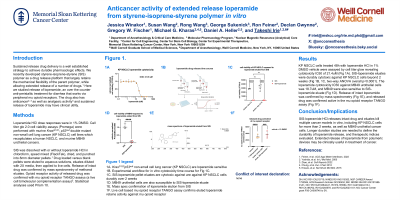Bioengineering (Focus Group – Bioengineering)
(133) Anticancer activity of extended release loperamide from styrene-isoprene-styrene polymer in vitro

Introduction: Sustained release drug delivery is a well established strategy to achieve durable pharmacologic effects. We recently developed styrene-isoprene-styrene (SIS) polymer as a drug release platform that largely retains the mechanical flexibility of the parent polymer, while allowing extended release of a number of drugs.1 Here we studied release of loperamide, an over the counter anti-peristaltic treatment for diarrhea that works via peripheral mu opioid receptors. The drug also has anticancer2, 3 as well as analgesic activity4 and sustained release of loperamide may have clinical utility.
Learning Objectives:
- Upon completion, participants will be able to describe the anti-cancer activity of loperamide.
- Upon completion, participants will be able to appreciate lasting cytotoxicity from SIS-loperamide.
- Upon completion, participants will be able to list two SIS-loperamide eluate sensitive cancers.
Jessica Winakor – Lab Technician, Anesthesiology-Critical Care, Memorial Sloan Kettering Cancer Center; Susan Wang – intern, Molecular Pharmacology Program, Memorial Sloan Kettering Cancer Center; Rong Wang – Senior Research Assistant, Nuclear Magnetic Resonance (Analytical) Core Facility, Sloan Kettering Institute; George Sukenick – Associate Lab Member, Nuclear Magnetic Resonance (Analytical) Core Facility, Sloan Kettering Institute; Ron Feiner – Equity Research Associate, J.P. Morgan; Declan Gwynne – Senior Associate Scientist, Generation Bio; Gregory Fischer – Chairman Attending, Anesthesiology-Critical Care, Memorial Sloan Kettering Cancer Center; Michael Kharas – Member, Molecular Pharmacology Program, Sloan Kettering Institute; Daniel Heller – Member, Molecular Pharmacology Program, Sloan Kettering Institute

Takeshi Irie, MD, PhD
Assistant Attending/Assitant Member Level 1
Memorial Sloan Kettering Cancer Center
New York, New York, United States

